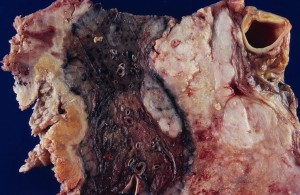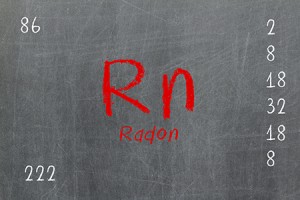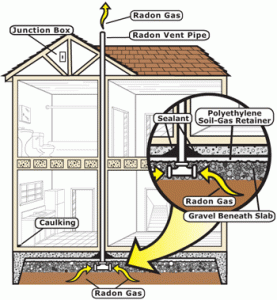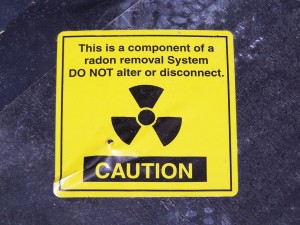
Image by Yale Rosen
Exposure to radon is the second leading cause of lung cancer. Unfortunately, lung cancer does not produce noticeable symptoms during it’s earliest stages.
By the time patients begin to see side effects, they are often long past a curable state. In approximately 40 percent of those with lung cancer, a majority of them were diagnosed after the disease has advanced to a deadly state. In about one third of those diagnosed, the lung cancer had already progressed to stage 3. This is why it is highly recommended that you undergo consistent screening if you believe that you are at risk.
With all of that aside, what are the symptoms of lung cancer? What are some signs everyone should watch out for? Please keep in mind that all the symptoms listed below generally indicated a more progressed stage of lung cancer, so if you believe you exhibit one of these symptoms you need to consult with a doctor immediately.
Nine Common Symptoms of Lung Cancer
Lingering Cough – If you contract a cough right along with a cold or respiratory infection it will generally go away within a week or so. If you have a cough that persists longer than that – or have had one – then it’s time to pay a visit to the doctor. Even if the chronic cough is not associated with lung cancer, it can signify other severe health issues. Your doctor will likely listen to your lungs and may order an X-ray to find the source of the problem.
Evolving Cough – Borrowing from the previous point, if your cough changes in any way it may be a sign of lung cancer or a serious lung illness – especially if you are a smoker. For example, if you find that you’re coughing more often than usual, if the sound has grown deeper or more course, or if you’re coughing up blood, then you need to visit a doctor.
Changes in Breathing – If you notice that you’ve grown short of breath more often, or if you’re having difficult breathing in any way these are possible symptoms of lung cancer. Depending on where the cancer or tumor is located is can block the airway, or build up fluid in the lungs. The easiest way to tell if there is a change is to assess activities that you could previously perform without difficulty breathing. If you find yourself running out of breath after climbing stairs – and you never did before – this is cause for alarm and warrants a visit to your doctor.
Chest Pain – Believe it or not, lung cancer can actually cause pain in the chest, shoulder, arm or back area. Most people associate this type of pain with heart attacks, but that’s not always the case. Often, the pain can be incurred through dull or consistent aches – it’s not always brought on by another issue like coughing. Lung cancer can cause chest pain when lymph nodes have enlarged or tumors have metastisized to the chest wall, pleura or ribs.
Wheezing – There are many health issues that can cause wheezing so this is definitely not a symptom exclusive to cancer. If the lungs or airways become constricted, blocked or inflamed somehow then it produces a wheezing noise when the affected individual breathes. Don’t just assume that your wheezing is caused by asthma, allergies, or minor lung issues – if you experience wheezing visit a doctor as soon as possible.
Raspy Voice or Changes – If you notice a change in your voice, such as it becomes more raspy and hoarse this is another possible symptom of lung cancer. If a tumor affects the larynx – or voice box – then it can cause some pretty blatant changes in the tone and sound of your voice. This issue can also be caused by a common cold or infection, but if the problem pesists for longer than two weeks an immediate check-up is recommended.
Drastic Weight Loss – A quick, or drastic change in weight is another symptom of lung cancer. The cancerous cells inside the body actually consume necessary energy, resulting in the body dropping weight – as if the person affected were working hard to lose it. If you notice a drastic change in weight and you haven’t change your lifestyle or habits, you might want to visit a doctor as soon as possible.
Bone Pain – This one might be a little harder to pinpoint, but it often causes those affected to experience pain in their back, neck or various areas of the body. Lung cancer can spread to the bones and cause pain in affected areas. Always discuss any discomfort, pain or aches with your doctor to ensure it’s not being caused by something more serious.
Headaches – Frequent headaches are common in those who have any form of cancer. This is often a sign that the cancer has spread to the brain, but it doesn’t necessarily mean that. Lung cancer can also cause headaches, because a tumor may press on the superior vena cava causing pressure. This is the vein that moves blood from the upper body back to the heart. If this vein is blocked it can cause some rather intense headaches.
Regular Check-ups and Screening Can Help
The mortality rate for lung cancer is so high because patients aren’t diagnosed until the later stages. This is why it’s important to pay regular visits to your doctor and undergo screening if you’re considered a high risk patient – or if cancer runs in your family.
Radon is certainly not the only cause of lung cancer, but at least you’ll know how to protect yourself in the event that you are exposed to elevated levels.










 How is Radon Formed?
How is Radon Formed?